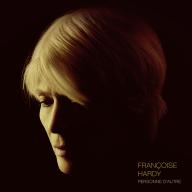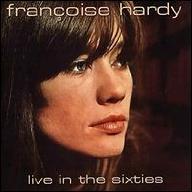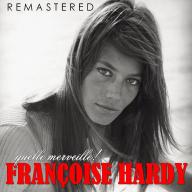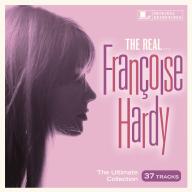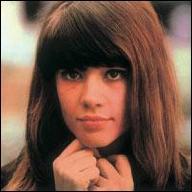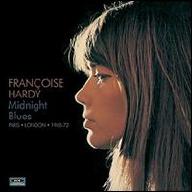Hardy was born in Paris in 1944. She and her sister were raised by a single mom who made a meager living as an accountant's assistant. Money was always in short supply. After graduating from high school, she was given a guitar by her absent father -- he had to be convinced by her mother to purchase it. As a teen she was influenced heavily by French chanson, especially the music of Charles Trenet and Cora Vaucaire. Thanks to the pervasive reach of Radio Luxembourg, she also found inspiration in the music of English-speaking singers such as Paul Anka, the Everly Brothers, Elvis Presley, Cliff Richard, and Connie Francis. While attending the Sorbonne to study political science and Germanic languages, she answered a newspaper notice advertising for young singers. Hardy failed that first audition, but she was inspired to attend others. She auditioned a bit later for the French Vogue label and signed her first recording contract at the end of 1961. She was 17. In April of the following year, she left university and released her first record, "Oh Oh Chéri," written by Johnny Hallyday's creative team. The flipside was her own composition "Tous Les Garçons et les Filles." Riding the emergent French wave of yé-yé introduced to the country by songwriter Serge Gainsbourg, the recording was a smash, selling over two million copies. In 1963, she took fifth place (for Monaco) in the Eurovision Song Contest with "L'amour s'en Va" and was awarded the Grand Prix du Disque. Soon she was on the cover of virtually every top music magazine. It was while working on a photo shoot for a magazine that Hardy would meet photographer Jean-Marie Perier, who transformed her image from a shy schoolgirl into a cultural trend setter. He became not only her lover but also the greatest influence on her early career. Their shoot established her as a fashion icon as well as a pop star, and Perier persuaded Hardy to model. Because of her place in pop music, he was able to persuade top designers including Paco Rabanne, Chanel, and Yves Saint-Laurent to adopt her as a model. French director Roger Vadim offered her a prime role in Château en Suède; the experience only increased her national popularity, but her heart was in music not cinema. In 1963 she sang at the L'Olympia Theatre in Paris for the first time as an opening act for yé-yé singer Richard Anthony. She stole she show. Her debut album was essentially an umbrella for her singles and sold exceptionally well, and the recording won the Prix de l'Académie Charles-Cros and Trophée de la Télévision Française awards. In 1965, she tried film again, this time Jean-Daniel Pollet's Une Balle Au Cœur. Released in February of 1966, her performance drew raves from critics and audiences alike. Hardy's reputation as a singer spread across Europe and soon she was spending time with artists ranging from the Beatles and Mick Jagger to Bob Dylan (the latter once refused to play his second set at L'Olympia until she showed up). She quickly became her country's most exportable pop star, releasing ten albums between 1962 and 1968.
Perier and Hardy ended their romance in 1967, the stress and strain of a jet-set lifestyle was beginning to take its toll. That said, she met songwriter and pop star Jacques Dutronc the same year and fell in love -- they wed in 1981. After massive whirlwind tours of Europe, she cut her sophomore outing, Ma Jeunesse Fout L'Camp, which was issued in 1968, just before the curtain fell on yé-yé in France. That same year she gave a farewell performance at London's famed Savoy and seemingly retired from the stage to concentrate on her recording career. This caused friction with her label and resulted in a court battle from which she emerged free but wary of all future business dealings. Hardy carefully considered her next step. In 1970, as a nod to her fans in Switzerland and Germany, she released the German-language Träume for United Artists. But it was a stop-gap. 1971's self-titled offering for Sonopress, written in collaboration with female Brazilian guitarist Tuca, was her first mature outing and featured the singles "Chanson d'O" and "La Question." While it didn't do well commercially, it remains the singer's favorite recording and the one that established her as an influence on later generations. She didn't care about the relatively poor sales; she considered it an artistic achievement, and history has proven her correct. The new decade also helped establish Hardy as burgeoning professional astrologer. In the summer of 1973 she gave birth to a son with Dutronc. Amazingly, the couple, not yet married, didn't live together until well after their child was born.
Hardy signed to the North American Warner Brothers label late in the year, and proceeded to record Message Personnel with producer Michael Berger. The pair disagreed on many things during the sessions, but its title track single became one of her most beloved songs. In the spring of 1974 she worked with French violinist, composer, and singer Catherine Lara and English producer Del Newman for Entr'Acte. The album was only a moderate success commercially, but has since become one of her most beloved among fans. Hardy abandoned fashion in 1974, and all but left music for two years to concentrate on being a mother. She did write and record "Que Vas-Tu Faire" for the soundtrack of Claude Lelouch's film Si C'était à Refaire. (It was arranged by Jean-Michel Jarre.)
Through a friend, Hardy met Gabriel Yared, a great fan of her music. He offered to produce and arrange a new album for her. Entitled Star, the set featured excellent material by herself, Michel Jonasz, Gainsbourg, William Sheller, Janis Ian, and Lara; it proved a commercial and critical success. Issued by Pathé-Marconi, Star revealed a different side of the singer, establishing her with a second generation of younger fans. The record sold exceptionally well and brought Hardy back to the forefront of French popular music. In all, the singer and producer/arranger cut four very successful albums together including J'Ecoute de la Musique Saoule (1978), Gin Tonic (1980), and A Suivre (1982, that was also the first of her albums to feature the talents of songwriter Jean Claude Vannier). The latter album featured two chart-topping singles in "Tamalou" and "Villégiature." Fans have argued for decades that the album would have been even more successful had she resumed touring, but Hardy was far more concerned with astrology and motherhood. Over the next two years, she released only two new singles while her label focused on issuing compilations. In 1988 she issued Décalage. Announced as her final recording, her lyrics were set to music by name writers including William Sheller, Etienne Daho, and husband Dutronc. Interestingly, while it has developed a reputation as one of her finest records, it was greeted with only middling praise at the time. Apparently, fans expected more from a grand finale.
Her retirement proved short-lived. In 1992, she recorded the duet "Si Ca Fait Mal" with songwriter Alain Lubrano, a young singer/songwriter from the south of France. The topic, about love, sex, and AIDS, was cut for the AIDS fund-raising compilation album Urgence. She later re-recorded it as one of her own singles -- again with Lubrano. In 1995, Hardy signed with Virgin Records. Le Danger, her debut for the label, appeared in 1996 and established her as a pop star -- at the age of 52 -- in the U.K. Hardy co-wrote all 13 songs, enlisting help from Lubrano and Rodolphe Burger (Kat Onoma). Deeply influenced by the alternative music scene -- especially the music of Portishead -- Hardy again reinvented her sound as a totally modern brand of indie pop. The album was successful beyond her dreams; she appeared at the BBC on radio and television, on John Peel's program and eventually guested on recordings by Malcolm McLaren and Blur.
Hardy crowned the new century with her second Virgin album, Clair-Obscur, in 2000. The set was marked by a wide range of songs from composers ranging from Django Reinhardt, Lubrano, and Daho to Eric Clapton and Don Everly. It also included a pair of critically regarded duets in "Puisque Vous Partez en Voyage" with Dutronc, and "I'll Be Seeing You" with Iggy Pop. In 2004, she issued Tant de Belles Choses, with songs by Lubrano, Benjamin Biolay, Thierry Stremler, and Jacno (Denis Quilliard of Stinky Toys fame). She also enlisted assistance from English singer/songwriter Ben Christophers and Irish songwriter Perry Blake. Her son, Thomas Dutronc, produced and/or played guitar on four tracks. Two years later she issued Parenthèses, a collection of duets with material from her back catalog. Her collaborators included Alain Bashung, Biolay, Rodolphe Burger, Maurane, Arthur H, and French film star Alain Delon. She also recorded with her husband and son at the same time -- a first. The set's first hit single was a version of "Partir Quand Même" with Julio Iglesias. Not touring left Hardy plenty of time for pursuits other than music and astrology, including writing. In 2008, Editions Robert Laffront published her memoir entitled Le Désespoir des Singes et Autres Bagatelles (The Monkey's Despair and Other Trifles). The book became an instant best-seller. Hardy didn't rest, however, and in 2010 issued the album La Pluie Sans Parapluie. She penned all the lyrics herself and collaborated on the music with Lubrano, Ben Christophers, Pascale Daniel, Stremler, and others. Rather than the cool, wry wit and melancholy that was her trademark, this set offered listeners a different portrait of the singer, one more sensitive and intimate. Two years later, Hardy celebrated her 50th anniversary in music with both a novel (her first) and an album that shared the title L'Amour Fou. She was also battling cancer of the lymphatic system and designated it her last album. She again composed all the lyrics with assistance on the music side from Stremler, Calogero, Benoît Carré (Lilicub) and Julien Doré. Dominique Blanc-Francard and Bénédicte Schmitt co-produced the recording.
While Hardy hasn't set any sales records with her post-millennial output, virtually all of her recordings did well enough to remain commercially viable and enhance her legend. In the aftermath of publication and release of L'Amour Fou, the singer was absent for nearly five years. After its release she became ill while undergoing chemo and eventually ended up in a coma for eight days. While recovering and continuing to undergo treatment, she had little to no interest in recording again -- that is, until she heard the song "Sleep" by the Finnish band Poets of the Fall. She played for producer and songwriter Erick Benzi (Celine Dion), who loved it. As a response, he sent Hardy several melodies of his own, inspiring her to pen lyrics for them. French indie songwriter La Grande Sophie (Sophie Huriaux) knew she had started writing again and emailed Hardy the song "Le Large." Other composers who contributed were Pascale Daniel and Yael Naim, who gave her "You're My Home." When Hardy began recording with Benzi, the sessions went uncharacteristically smoothly, resulting in the album Personne d’Autre. Preceded by the single "Le Large"--which was also released as a video directed by François Ozon, Rovi


